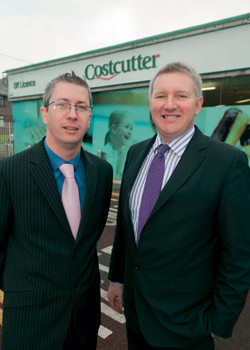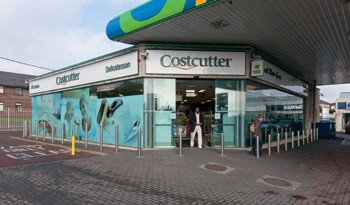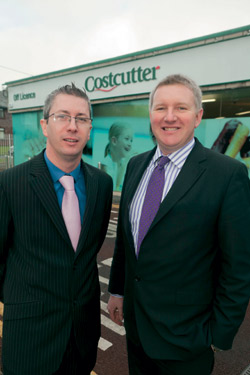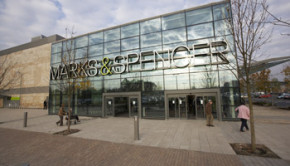Neccessity is the mother of all invention

Car showroom owner Noel McIntyre decided to radically alter his business plan to fit the new reality of the times, with Buy Lo and Costcutter playing central roles
15 March 2011
 Profile
Profile
Buy Lo and Costcutter, Mullingar
Owner: Noel McIntyre
Manager: Brendan Granahan
Size: 12,000 sq ft (Buy Lo) and 2,000 sq ft (Costcutter)
Staff: 45
Retail can be said to be a labour of love for many in the trade. However this was the case more than most for businessman Noel McIntyre’s parents. Moving from Cavan to Mullingar in the late sixties in order to establish a car sales business, their chosen site at the time was in actual fact effectively a lake. This they promptly set about draining “with machinery of the era” which as McIntyre rightly states was “no mean feat.”
Following much hard work, his mother and father succeeded in creating a viable site in a prime location on the main Dublin road. Here they established Westmeath Motors in 1967.
Evolution of a c-store
From the “very early days”, they also introduced a Shell petrol station on the site. In the 70s and 80s this stood beside the type of shop ubiquitous at that time; “a hut with one good man on the job.” Although a far cry from today’s sophisticated c-stores, “the hut” also evolved with the morés of its times; developing into an independent brand and later becoming a Centra store, and most recently, transforming into its latest incarnation as a Costcutter store.

The Barry Group’s Damien Johnston pictured beside store manager Brendan Granahan
Explaining the evolution of his new business model, McIntyre begins his tale at the start of 2008 – the year “when the economy started to unravel. Up to that point, everything had been rosy in the garden as we all know. Even the first quarter in 2008 was pretty buoyant, or at least a perception existed that it was buoyant.”
Danger ahead
Working in the car trade, an industry that provides “a good indication of the state of the economy,” the switched-on entrepreneur quickly realised all was not as it seemed. Used cars weren’t selling, “and then when we looked down the line into March and April, there were no new orders for new cars being placed. We surmised that things were grinding to a halt and the activity in those first two months was merely a spill-over from the previous year.”
He could see the same trend occurring in the construction industry and realised a “difficult time was coming down the line.” Their offering would need to be drastically altered to fit consumers’ new mentality and budgets. As he succinctly sums up: “We needed to reduce our dependency on the motoring trade and on the high convenience strategy.”
A new plan
Then in the summer of 2008, McIntyre’s team met with the Barry Group. “Very quickly, both parties realised the potential for a Buy Lo format, so we struck a deal and we were awarded a franchise. It was also agreed in principle at the time to take on the Costcutter brand and the forecourt.”
The following year was “devoted to planning, raising finance, and all that goes with setting up a new business.” Buy Lo then opened in what was formerly a car showroom in August 2010 and the c-store changed over to Costcutter in October 2010. McIntyre believes this “very carefully planned restructuring of the company” has resulted in the group becoming “very well positioned for what we believe is going to be a very tough 10 years.”
Substantial investment
Costcutter also has a strong value perception for consumers, according to McIntyre and “the cost of running the franchise is lower.” The Barry Group “don’t mind the retailer getting their share of margin, and their franchise fees are a lot less.”
While the retailer feels his costs are now lower for the c-store, he nevertheless had to make a €1 million investment to fulfil his overall plan. He highlights that securing finance at the time wasn’t an easy task either, with the banks reluctant to lend to SMEs in 2009.
What’s more, obtaining a change of use planning permit “was pretty rigorous, but we got there.” With this status not granted until March 2010, it was undoubtedly a time-consuming task, yet ultimately proved worthwhile. In February 2008 the company had to implement a redundancy programme, reducing its staff from 42 to almost half that number, however today the group once again employs 45 people overall.
Pressing politics
He feels strongly that the government shouldn’t exclusively focus on large multinationals such as Intel, but also invest in small businesses and family companies that play an important role in bolstering their local economies. “Our wage bill will be heading back up to a million euro. That is a million euro that’s going right back into the economy, into the town in Mullingar.”
On the subject of politics and with the election imminent at the time of our interview, ShelfLife asks what he believes is the most important issue currently facing retailers and receives an unsurprising answer. The Joint Labour Committee wage rates, are in his view “a Jurassic remnant of the Celtic Tiger”. Whereas “most of our peers in the motor trade, to date, have taken typically a 10 – 15% cut in their wages,” McIntyre believes it’s “absolutely crazy” that he can’t try to come to a similar agreement with Costcutter and Buy Lo staff, in a bid to keep everyone employed in a job.
Adapting to the new reality
This “disjointed policy” aside, the retailer’s staff have certainly been willing to do whatever is necessary to make a success of the business. Current store manager Brendan Granahan is a prime example. With the company since the age of 16, Granahan started off washing cars and progressed to a sales man and then sales manager. However McIntyre could not afford to keep him employed in the car trade and so offered him a job as the Costcutter store manager which he gamely accepted.
“In fairness, Brendan, he had to undertake a complete career change, absolutely black and white.” However the former sales manager “made it his business to get to know every part” of the trade, and according to McIntyre, “he’s by far the best store manager we’ve had there over the years.
“They say necessity is the mother of invention and I think people who are going to survive this, have to adopt that attitude, that they’ll do whatever’s necessary.”
Exceeding expectations
The success Buy Lo has experienced since it opened shows that change can certainly deliver positive results. McIntyre reports that it “exceeded all of our expectations” and was so busy on its first day that the whole system “nearly crashed.”
As well as Buy Lo being built on the premise of offering brands at low prices, and of course being Irish, McIntyre believes that “the one area where we can excel and where we in fact, can wipe out the competition, is in customer service.” On a Saturday, there’s “a constant stream of staff carrying boxes and shopping in and out to people’s cars.”
Local suppliers are an important part of the Costcutter’s offering, and in order to offer customers something a little different, the team have actually gone one step further by offering a farmers market on-site every Friday. This features “about nine or 10 local artisan food producers, and various other arts and crafts, located under the canopies in the compound.”
Room for development
He also believes the format can offer exciting possibilities for the future. He has been able to install an independent butchery section within Buy Lo, namely McCarren’s from Cavan. Operating under licence in-store, McIntyre says of McCarren’s that they’re “fifth generation butchers, an absolute quality craft butchers.”
Following on from this agreement, the group has also secured a deal with a fish mongers from Mullingar. George Stevens is “an expert and trained chef” with “a great reputation” and his brand The Fish Market, will also be housed within Buy Lo.
With another 12,000 sq ft of property to potentially develop next door to the existing Buy Lo store, McIntyre believes opportunities exist to introduce more specialist retailers in the future, such as a florist or pharmacy. “Guys who might not be able to secure finance to get into the highstreet, or maybe won’t have the appetite for that risk. Whereas under our roof, [with all goods paid for through the Buy Lo tills], we can offer them the scanning, the IT, and the guaranteed footfall for very little capital cost, [with] the Buy Lo taking a percentage.”
A unique identity
However it is important that the brand doesn’t attempt to compete with Tesco in terms of product range. After the store first opened, people did ask for products that weren’t there and “the easiest thing” would have been to order them in. However “we’ve got to resist that because you’re just going to get engulfed into the mainstream then and you’ll be gobbled up.
“Our whole model is based on low costs and that goes for the butcher and the Fish Market as well.” According to McIntyre as long as the premises are “clean and well ventilated with friendly staff”, there’s no need to “incur high capital cost.”
Overall the retailer is adopting a positive approach and doesn’t agree when people say there’s no growth in the convenience sector. “If you’ve got the right offering there is,” he claims. For example, in the Costcutter deli, the store recently changed its offering and prices; adopting “a back to basics” approach which has proved “transformational nearly. The business is coming in.” Surely the primary goal of all stores if they are to survive and thrive during the uncertain financial future ahead – regardless of size or format.



 Print
Print






Fans 0
Followers